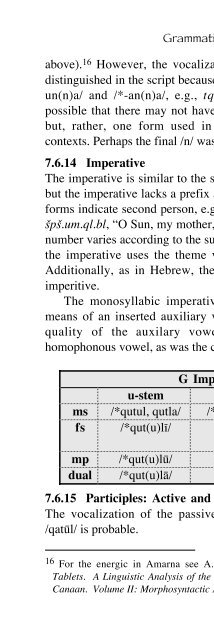A Primer on Ugaritic: Language, Culture, and Literature - enenuru
A Primer on Ugaritic: Language, Culture, and Literature - enenuru
A Primer on Ugaritic: Language, Culture, and Literature - enenuru
You also want an ePaper? Increase the reach of your titles
YUMPU automatically turns print PDFs into web optimized ePapers that Google loves.
Grammatical Précis 173<br />
above). 16 However, the vocalizati<strong>on</strong> of the energic forms is not<br />
distinguished in the script because the letter n may indicate both /*un(n)a/<br />
<strong>and</strong> /*-an(n)a/, e.g., tqln, “may you fall down.” It is<br />
possible that there may not have been two distinct energic forms<br />
but, rather, <strong>on</strong>e form used in both indicative <strong>and</strong> injunctive<br />
c<strong>on</strong>texts. Perhaps the final /n/ was appended for euph<strong>on</strong>ic reas<strong>on</strong>s.<br />
7.6.14 Imperative<br />
The imperative is similar to the short prefixed verb form (jussive),<br />
but the imperative lacks a prefix <strong>and</strong> is basically m<strong>on</strong>osyllabic. All<br />
forms indicate sec<strong>on</strong>d pers<strong>on</strong>, e.g., tn.ks.yn, “give a cup of wine!”;<br />
sûpsû.um.ql.bl, “OSun, my mother, bring the voice!” The gender <strong>and</strong><br />
number varies according to the subject of the verb. For vocalizati<strong>on</strong><br />
the imperative uses the theme vowel of the prefix c<strong>on</strong>jugati<strong>on</strong>.<br />
Additi<strong>on</strong>ally, as in Hebrew, there was a l<strong>on</strong>ger form of the ms<br />
imperitive.<br />
The m<strong>on</strong>osyllabic imperative (qtVl) becomes bisyllabic by<br />
means of an inserted auxiliary vowel (anaptyxis). Although the<br />
quality of the auxilary vowel is uncertain, the use of a<br />
homoph<strong>on</strong>ous vowel, as was the case in Akkadian is suggested.<br />
G Imperative<br />
u-stem i-stem a-stem<br />
ms /*qutul, qutla/ /*qitil, qitla/ /*qatal, qatla/<br />
fs /*qut(u)lˆä/ /*qit(i)lˆä/ /*qat(a)lˆä/<br />
mp /*qut(u)luœ/ /*qit(i)luœ/ /*qat(a)luœ/<br />
dual /*qut(u)laœ/ /*qit(i)laœ/ /*qat(a)laœ/<br />
7.6.15 Participles: Active <strong>and</strong> Passive<br />
The vocalizati<strong>on</strong> of the passive participle is uncertain, though<br />
/qatuœl/ is probable.<br />
16 For the energic in Amarna see A. F. Rainey, Canaanite in the Amarna<br />
Tablets. A Linguistic Analysis of the Mixed Dialect Used by the Scribes from<br />
Canaan. Volume II: Morphosyntactic Analysis of the Verbal System, 221–264.


